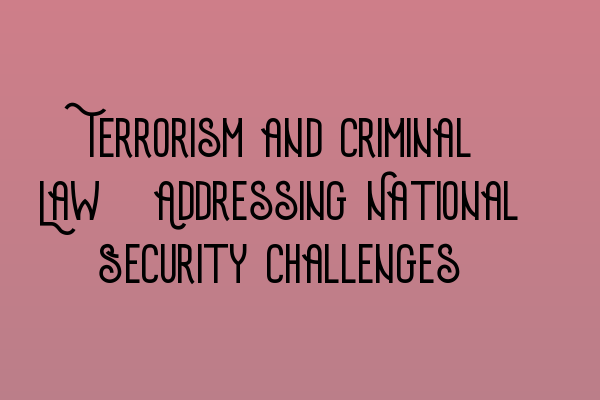Terrorism and Criminal Law: Addressing National Security Challenges
As the Solicitors Qualifying Exam (SQE) Criminal Law & Practice Law UK writes, terrorism is an evolving national security challenge that requires constant vigilance and effective legal measures. This blog post aims to explore the intersection between terrorism and criminal law, delving into the legal framework surrounding counter-terrorism efforts and the challenges faced in maintaining national security.
The Legal Framework
Under UK law, terrorism is defined as an act of violence or threat of violence committed for political, religious, or ideological purposes. The Terrorism Act 2000 provides the foundation for prosecuting individuals involved in terrorism-related activities, outlining offenses such as possession of terrorist materials, membership of a proscribed organization, and incitement to commit acts of terrorism.
Furthermore, the Counter-Terrorism and Border Security Act 2019 strengthened legislation in response to emerging threats. This legislation introduced new offenses relating to viewing or streaming terrorist material, holding extremist propaganda, and preparing for terrorist acts. It reflects the government’s commitment to adapt the legal framework to address evolving national security challenges effectively.
Challenges in National Security
Addressing terrorism requires a careful balance between protecting national security and safeguarding individual rights. It is essential to ensure that legal measures provide the necessary tools for law enforcement agencies without encroaching on civil liberties.
One of the significant challenges faced in counter-terrorism efforts is the identification and prosecution of individuals involved in terrorism-related activities. Gathering evidence, proving intent, and establishing the link between an individual and a terrorist organization can be a complex task. The legal framework must be robust enough to support effective investigations and ensure fair trials.
In an era of digital communication, online extremism poses an additional challenge. The internet has become a breeding ground for radicalization and the dissemination of extremist ideologies. Online platforms must be monitored, and legal mechanisms should be in place to tackle the spread of terrorist propaganda and recruitment.
The Role of Solicitors
Solicitors play a vital role in the fight against terrorism and the protection of national security. They provide legal advice, represent clients, and assist in navigating the complexities of counter-terrorism legislation. Solicitors specializing in criminal law help ensure that the rights of both the accused and the victims are upheld throughout the legal process.
It is crucial for solicitors to stay informed and up to date with the evolving legal landscape surrounding terrorism. Continuing professional development and specialized training courses, like those offered by SQE Criminal Law & Practice Law UK, can help solicitors enhance their knowledge and skills in this critical area of law.
Conclusion
Terrorism poses significant national security challenges that require a robust legal framework and the expertise of skilled solicitors. By addressing these challenges effectively, we can ensure the safety of our society while upholding the principles of justice and the rule of law.
For more information on criminal law and the SQE examination, you may find the following articles helpful:
- SQE 1 Practice Exam Questions
- SQE 1 Practice Mocks FLK1 FLK2
- SQE 2 Preparation Courses
- SQE 1 Preparation Courses
- SRA SQE Exam Dates
